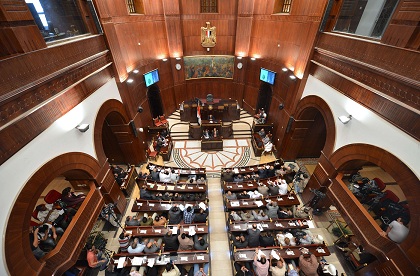
By Stephen Collinson (AFP)
The White House signaled Thursday that President Barack Obama is ready to go it alone to strike Syria despite the British parliament’s rejection of military action and the lack of a UN mandate.
Aides said Obama believes that Syria must pay a price for breaking taboos on the use of chemical weapons, action which he sees as posing a grave threat to US national security.
US plans to build an international coalition for a “limited” strike on Syria suffered a devastating blow when the House of Commons in London voted against the use of force to punish a chemical weapons attack last week outside Damascus.
US officials signaled earlier Thursday that Obama would take unilateral action if necessary, but the possibility became a reality with the vote, which reverberated immediately across the Atlantic.
“We have seen the result of the parliament vote in the UK tonight,” National Security Council spokeswoman Caitlin Hayden said.
“The US will continue to consult with the UK government — one of our closest allies and friends.
“As we’ve said, President Obama’s decision-making will be guided by what is in the best interests of the United States.
“He believes that there are core interests at stake for the United States and that countries who violate international norms regarding chemical weapons need to be held accountable.”
The drama in London will likely exacerbate rising disquiet in the US Congress about the prospect of American engagement in another Middle Eastern war.
It also leaves Obama exposed politically and internationally, as he argues that a robust US response is needed to deter President Bashar al-Assad’s regime from using chemical weapons again.
While other US allies, including France, have called for action on Syria, it appears unlikely they would join US military action absent a UN Security Council mandate, which has no chance of evading a Russian veto.
As the British vote took place, senior US officials including the secretaries of state and defense, John Kerry and Chuck Hagel, briefed top lawmakers on possible responses to the attack in a Damascus suburb last week that killed hundreds of people.
While British Prime Minister David Cameron recalled parliament for the fateful debate on Syria, there were no plans for the US Congress, which is in recess, to do likewise.
The White House will likely argue that since its proposed action in Syria will be “limited,” it does not require Congress to wield its constitutionally granted power to authorize a declaration of war.
But there will be increasing demands from Obama’s opponents for a debate in Congress, which could prove embarrassing for the US commander-in-chief.
The Obama administration earlier denied that public skepticism dating to an Iraq war intelligence debacle was complicating its effort to justify possible military action against Syria.
The intelligence community was working on a declassified public report on the attack, which officials said will show there is no doubt that Assad’s regime shattered used chemical weapons on civilians, despite its denials.
The White House said that while Obama prized the United Nations and closely consulted allies, his first duty was to US national security, which he sees threatened by the Syrian attack.
“The president’s chief accountability is to the American people that he was elected to protect,” said White House spokesman Josh Earnest.
The political fracas in London sparked speculation that a timetable for action, which many observers had believed could see air strikes in Syria within days, could slip.
But at the State Department, spokeswoman Marie Harf said: “We make our own decisions in our own timeline.”
The Obama administration also hinted that it did not see the need to wait for a report by UN inspectors in Syria on the chemical attack on a Damascus suburb on August 21.
It reasons that since the panel’s mandate is merely to establish an attack happened, and not to apportion blame, its findings are moot.
On Wednesday, the Obama administration said it did not see any future in a British bid to secure a mandate from the UN Security Council for attacking Syria, due to Russian opposition.
Obama sees perils to US national security in the belief that Syria shattered international norms by using chemical weapons, and that US interests and regional allies could be threatened next.
Obama aides stress they envisage only “limited” punitive action in Syria and dismiss comparisons with the US invasion of Iraq, which the president built his political career on opposing.
The discrediting of what was once deemed “slam dunk” intelligence on Iraq’s weapons of mass destruction is imposing a high burden of proof on the current administration.
Center for Strategic and International Studies analyst Anthony Cordesman termed the coming report the “most important single document in a decade.”
But officials denied the Syria drama was in any way comparable to Iraq.
“Nobody needs an intelligence community assessment to know that chemical weapons were used here,” said Harf.
“In Iraq, we were waiting for an intelligence community assessment to determine whether they even existed. Those are two categorically different levels of assessment being done here.”


